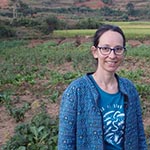 Chercheure
Chercheure
IRD Antananarivo
IRD, UMR Eco&Sols, Laboratoire des RadioIsotopes, BP 3383, Route d'Andraisoro, 101 Antananarivo, Madagascar
Téléphone : +261 (0)32 47 126 74
Email : Cette adresse e-mail est protégée contre les robots spammeurs. Vous devez activer le JavaScript pour la visualiser.
Chargée de recherches
Short CV
2021 – present: Researcher at IRD, UMR Eco&Sols, Montpellier, France
2017-2020: Postdoc, Marie-Curie Fellowship, University of Göttingen, Germany
Topic: “Let restore our soils: using the soil food web to engineer the soil structure and functioning”
2013-2016: Postdoc, UMR AMAP, INRAE, Montpellier, France
Topic: “Root trait variations along successional dynamics in the mediterranean region”
2010-2013: PhD Thesis, University of Grenoble Alpes, Grenoble France
Thesis title: “In situ interaction between plant functional traits composition and soil properties in Mediterranean Badlands ecosystems undergoing ecological restoration”
2008-2010: Ecole Nationale du Génie Rural, des Eaux et des Forêts (ENGREF, AgroParisTech, Paris, France)
2005-2008: Bachelor and Master studies in Biologie at Ecole Normale Supérieure de Lyon (ENS lyon, France)
Key expertise
Soil ecology; Root ecology; Soil biodiversity; Soil food web; Microbes; Microfauna; Mesofauna; Trait-based approach; Soil physics; Soil structure; Soil habitat; Soil erosion; Ecological engineering; Ecological intensification
Research interests
I am interested in the formation of the soil habitat at small spatial scales and its effect on biotic interactions and soil functioning. I am adopting an interdisciplinary approach, merging soil physics and soil ecology, with a focus on soil structure. I am considering a wide diversity of soil biota, including plant roots, microbes, microfauna and mesofauna, and their interactions. Using both field and laboratory approaches, my research aims at unravelling fine scale “eco-physico-chemical” processes in soil, thereby facilitating the development of ecological engineering strategies to restore degraded soils and intensify their functioning, notably in agroecological systems.
The soil is such a complex and fascinating habitat! This is not dirt, rather a maze full of life. The way soil organisms move, interact and feed in this belowground maze is crucial for soil functioning, such as carbon storage and nutrient recycling. Most soil organisms face restrictions in mobility, strongly constrained by soil structure, limiting potential interactions. The soil structure is highly heterogeneous and dynamic, making it tricky to investigate. Tools to quantitatively describe soil structure in two or three dimensions across scales and possibilities to manipulate soil physical parameters for experimental purposes with living organisms are only yet being developed. Soil microbial ecologists partnering with soil physicists have pioneered this field and their work opens novel possibilities to the entire community of soil ecologists. I am enthusiastically grabbing this opportunity and aim at deciphering the complex interplay between soil organisms and soil structure.
Editorial
2017 – Present: Section Editor for Plant and Soil
Currently leading a Special Issue on Ecological intensification. Your submissions are welcome!
Outreach
A few examples of outreach activities:
L’agroécologie au Nord et au Sud : une solution pour l’avenir ? (In French)
Planet@liment (In French)
Soil ecologists as detectives discovering who eats whom or what in the soil (In English)






